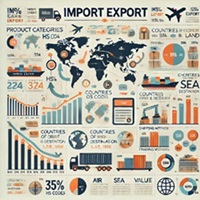
Import-export data is essential in crafting trade policies, balancing economies, protecting industries, and expanding global market access
Global trade policies are essential frameworks guiding countries’ economic relationships internationally. These policies influence tariffs, quotas, market access, and standards. A crucial tool in crafting and updating trade policies is import export data, which provides insight into trade volumes, market demand, economic balances, and supply chain dynamics. Analyzing this data enables policymakers to make decisions that align with national goals and respond to global economic shifts.
Import-export data captures detailed records of goods and services exchanged between countries, including trade volume, product categories, values, origins, and destinations. This data can be segmented by country, industry, and time period, offering policymakers a deep view of global trade flows. Import-export data is vital for assessing trade balances, detecting deficits or surpluses, and understanding sectoral dependencies, all of which are essential for effective economic policy.
Import-export data helps assess a country’s trade balance—the difference between exports and imports. A surplus indicates more exports than imports, which often suggests economic strength, while a deficit may indicate a reliance on foreign goods. Countries with deficits often target sectors with high imports to encourage local production and reduce dependencies.
For example, if data shows high imports in the technology sector, a country might introduce policies that support local tech development, decreasing dependency on foreign imports and boosting the national economy.
Import-export data allows policymakers to identify sectors where a country holds a competitive advantage, such as agriculture, technology, or energy. By focusing on these areas, governments can enhance trade policies to foster growth and expand market access.
If, for instance, data shows strong international demand for agricultural products, the government may negotiate trade agreements that favor these goods. Policies can include reduced export barriers, infrastructure investment, or subsidies for local producers, which collectively expand access to foreign markets.
Import-export data helps identify sectors vulnerable to foreign competition. When inexpensive imported goods flood a market, local industries may struggle to compete—commonly seen in steel, textiles, and agriculture sectors.
For example, if import data reveals a surge in low-cost textiles, policymakers may introduce tariffs or quotas to protect domestic manufacturers. By regulating imports, governments can support local jobs and maintain economic stability in key sectors.
Import-export data reveals dependency on specific trade partners and can highlight the need for trade diversification. When a country heavily depends on a single partner for crucial imports, it risks economic instability if trade relations change.
By analyzing trade data, policymakers can seek alternative suppliers and form new trade agreements to reduce reliance on any single partner. Diversifying trade relationships strengthens resilience and reduces the risks associated with economic dependency on specific regions.
Import-export data is fundamental in setting tariffs, quotas, and trade agreements. Tariffs make imported goods more costly, while quotas limit import volumes to protect domestic industries. By examining trade data, governments can identify products or sectors suitable for these protective measures.
Trade agreements, such as the EU or US free trade deals, are also guided by trade data to secure favorable terms for domestic industries. Policymakers use this data to negotiate terms that benefit national industries while fostering fair and cooperative global trade practices.
Although essential, using import-export data has challenges. Data inconsistencies across countries and time lags can complicate policy-making, as can sudden events like economic crises or global conflicts. Nevertheless, advancements in big data and AI may improve real-time data collection and analysis, enabling quicker responses to changing trade conditions.
Import-export data is invaluable in shaping global trade policies, providing insights into trade balances, competitive sectors, and foreign dependencies. Policymakers use this data to create targeted policies that bolster domestic industries, protect against economic vulnerabilities, and expand market access. While challenges remain, import-export data will only grow more crucial in policy-making as technology advances and international trade relationships evolve.
© 2024 Crivva - Business Promotion. All rights reserved.